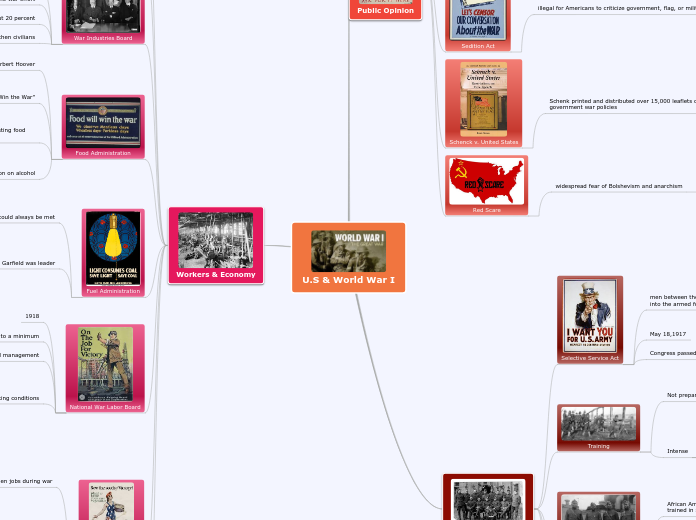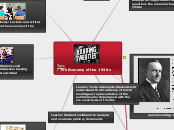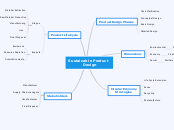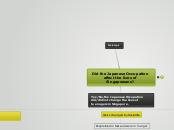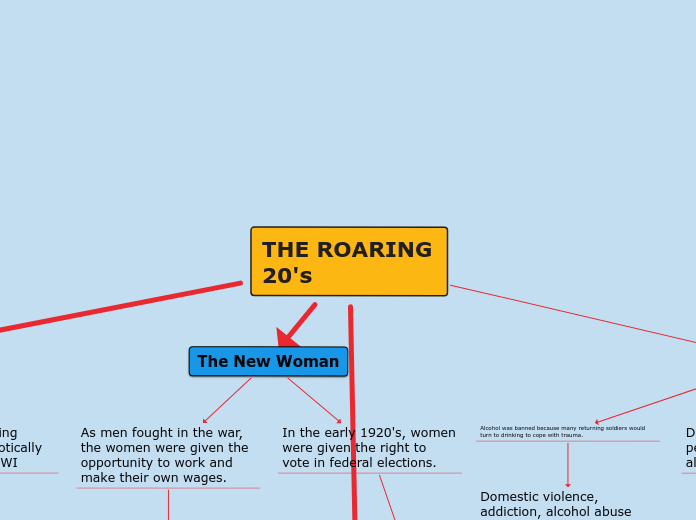U.S & World War I
Workers & Economy
Great Migration
African Americans moved from rural South to Northern cities
over 6 million
1916-1970
Women's War Efforts
about 1 million women entered the workforce during WWI
many left jobs after war ended
took on traditional women jobs
volunteer positions to help sell bonds
teachers
took on traditional men jobs during war
built ships and airplanes
factories
docks
built railroads
National War Labor Board
set policies that improved working conditions
equal pay for women
suported labor unions
8 hour work day
judged disputes between workers and management
about 1,200 cases resolved, including 700,000 workers
kept disruptions to a minimum
1918
Fuel Administration
Harry Garfield was leader
"heatless Mondays"
"gasless Sundays"
introduced daylight savings time
extend daylight hours for those who worked long shifts in the factories
make sure the military needs for fuel could always be met
Food Administration
prohibition on alcohol
18th Amendment
1919
banning the "manufacture, sale, or transportation" of alcohol in the U.S
increase the production of crops and conserve existing food supplies for the military and Allies
"Food Can Win the War"
"Wheatless Wednesdays"
"meatless Mondays"
led by Herbert Hoover
War Industries Board
military first, then civilians
increased American industrial production by about 20 percent
authority to regulate all materials needed in the war effort
led by Bernard Baruch
Wall Street businessman
Liberty Bonds
sparked national debt to increase
more than $20 billion of U.S debt was owed to Americans
a loan from American people to federal government
government needed to borrow money from civilians to pay for the war
War Revenue Act of 1917
very high taxes and taxed the wealthiest Americans as much as 77% of annual income
increased federal revenues by 400 percent within two years
The Military
Fighting
Second Battle of the Marne
U.S blew up every bridge the Germans had built across the Marne
Germans retreated on August 3
suffered around 150,000 casualties
July 15,1918
Battle of Belleau Wood
June 1918
8,000 causualties
America's bloodiest battle
Women
navy or marines
bookkeepers or typists
nurses
serve overseas as switchboard operators
kept communications open between front lines and headquarters of the army
Segregation
Latinos assigned menial tasks instead of combat
only a few black men were trained for combat with guns
African Americans soldiers were segregated into divisions and trained in separate camps
Training
Intense
pretended to ride wooden barrels
practiced with wooden sticks
soldiers spent days learning military rules and practices
Not prepared
supplies were not readily available
soldiers slept in tents
Selective Service Act
Congress passed
May 18,1917
men between the ages of 21 and 30 to register to be drafted into the armed forces
Some men wanted to be conscientious objectors
These men faced prison when their requests were rejected
Many men volunteered
Public Opinion
Red Scare
widespread fear of Bolshevism and anarchism
because of Russian Revolution
Bolsheviks rebelled against territory within their own country
Schenck v. United States
Schenk printed and distributed over 15,000 leaflets opposing government war policies
Argued the conviction as a violation of constitutional rights to free speech
Supreme Court upheld Schenck's conviction
Sedition Act
illegal for Americans to criticize government, flag, or military
over 1,000 people jailed over these laws
many citizens believed this violated the 1st amendment
Espionage Act
1917
punished people for aiding the enemy or refusing military duty
Committee on Public Information
created propaganda to influence opinions
some violence and discrimination resulted
made Americans anti-German everything
changed sauerkraut to be "liberty cabagge"
German language stopped being taught
created a stigma around American Germans
made Americans support the war effort
George Creel heads the CPI
